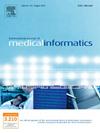The actual performance of large language models in providing liver cirrhosis-related information: A comparative study
IF 3.7
2区 医学
Q2 COMPUTER SCIENCE, INFORMATION SYSTEMS
International Journal of Medical Informatics
Pub Date : 2025-05-05
DOI:10.1016/j.ijmedinf.2025.105961
引用次数: 0
Abstract
Objective
With the increasing prevalence of large language models (LLMs) in the medical field, patients are increasingly turning to advanced online resources for information related to liver cirrhosis due to its long-term management processes. Therefore, a comprehensive evaluation of real-world performance of LLMs in these specialized medical areas is necessary.
Methods
This study evaluates the performance of four mainstream LLMs (ChatGPT-4o, Claude-3.5 Sonnet, Gemini-1.5 Pro, and Llama-3.1) in answering 39 questions related to liver cirrhosis. The information quality, readability and accuracy were assessed using Ensuring Quality Information for Patients tool, Flesch-Kincaid metrics and consensus scoring. The simplification and their self-correction ability of LLMs were also assessed.
Results
Significant performance differences were observed among the models. Gemini scored highest in providing high-quality information. While the readability of all four LLMs was generally low, requiring a college-level reading comprehension ability, they exhibited strong capabilities in simplifying complex information. ChatGPT performed best in terms of accuracy, with a “Good” rating of 80%, higher than Claude (72%), Gemini (49%), and Llama (64%). All models received high scores for comprehensiveness. Each of the four LLMs demonstrated some degree of self-correction ability, improving the accuracy of initial answers with simple prompts. ChatGPT’s and Llama’s accuracy improved by 100%, Claude’s by 50% and Gemini’s by 67%.
Conclusion
LLMs demonstrate excellent performance in generating health information related to liver cirrhosis, yet they exhibit differences in answer quality, readability and accuracy. Future research should enhance their value in healthcare, ultimately achieving reliable, accessible and patient-centered medical information dissemination.
大型语言模型在提供肝硬化相关信息中的实际表现:一项比较研究
目的随着大语言模型(large language models, LLMs)在医学领域的日益普及,由于肝硬化的长期管理过程,患者越来越多地转向先进的在线资源获取肝硬化相关信息。因此,有必要对法学硕士在这些专业医学领域的实际表现进行全面评估。方法本研究评估4种主流LLMs (chatgpt - 40、Claude-3.5 Sonnet、Gemini-1.5 Pro和Llama-3.1)在回答39个肝硬化相关问题中的表现。使用确保患者质量信息工具、Flesch-Kincaid指标和共识评分对信息质量、可读性和准确性进行评估。并对llm的简化和自我校正能力进行了评价。结果各模型的性能存在显著差异。双子座在提供高质量信息方面得分最高。虽然四位法学硕士的可读性普遍较低,需要大学水平的阅读理解能力,但他们在简化复杂信息方面表现出较强的能力。ChatGPT在准确率方面表现最好,“良好”评级为80%,高于Claude (72%), Gemini(49%)和Llama(64%)。所有模型的综合得分都很高。四个llm都表现出一定程度的自我纠正能力,通过简单的提示提高了初始答案的准确性。ChatGPT和Llama的准确率提高了100%,Claude提高了50%,Gemini提高了67%。结论llm在生成肝硬化相关健康信息方面表现优异,但在回答质量、可读性和准确性方面存在差异。未来的研究应提高其在医疗保健中的价值,最终实现可靠、可及、以患者为中心的医疗信息传播。
本文章由计算机程序翻译,如有差异,请以英文原文为准。
求助全文
约1分钟内获得全文
求助全文
来源期刊

International Journal of Medical Informatics
医学-计算机:信息系统
CiteScore
8.90
自引率
4.10%
发文量
217
审稿时长
42 days
期刊介绍:
International Journal of Medical Informatics provides an international medium for dissemination of original results and interpretative reviews concerning the field of medical informatics. The Journal emphasizes the evaluation of systems in healthcare settings.
The scope of journal covers:
Information systems, including national or international registration systems, hospital information systems, departmental and/or physician''s office systems, document handling systems, electronic medical record systems, standardization, systems integration etc.;
Computer-aided medical decision support systems using heuristic, algorithmic and/or statistical methods as exemplified in decision theory, protocol development, artificial intelligence, etc.
Educational computer based programs pertaining to medical informatics or medicine in general;
Organizational, economic, social, clinical impact, ethical and cost-benefit aspects of IT applications in health care.
 求助内容:
求助内容: 应助结果提醒方式:
应助结果提醒方式:


